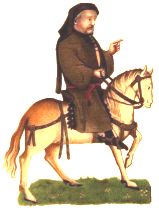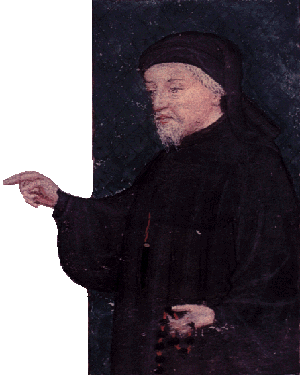
Joseph P. Thomas defines Chaucer’s life at http://www.newadvent.org: “John Chaucer, Geoffrey’s father, was a vintner and his mother Agnes was a heiress. John was connected with the Court, and once saw Flanders in the royal trim. Geoffrey was well educated, but whether he entered at either university remains unknown.” Chaucer married above his class to Philippa Roet who was a daughter of Sir Paon or Payne de Roioet Guienne, the knight at arms. They had three children, and their marriage was unhappy. Thomas inserted a lot of detailed information about Chaucer’s work, although his site is unattractive. The text is plain without any pictures, frames, or interactive sites. This web site is not easy to read and is unappealing, although it is a very useful tool in a search for details about Chaucer’s life and his time.
The Luminarium organization at http://www.luminariu.org posted biographies of all English poets who lived between the fourteenth and the seventeenth centuries. Generally, this site uses information about Chaucer for commercial reasons and it makes a profit by offering essays for sale on any topic related to this great poet. Luminarium connects us to major bookstores where we can purchase books and we can download voice text of the “General Prologue” and a few of the tales. The Luminarium site has frames and a link to http://www.infoplease.come, where we can do more detailed research. The site is very user-friendly and has valuable information.
Finally, Harvard University offers a great Web site located at http://www.icg.fas.harvard.edu. The site has information about Chaucer’s life, The Canterbury Tales, and other poets from medieval Europe. The Harvard site lists literary subjects, and discusses life and manners of the time as well as science, language and linguistics from the period. Quotations in the original medieval English and their translation into modern English are very helpful in searching or finding any specific information. We find here that the only non-fictional fragment of autobiography that we have from Chaucer is listed in “The Scrope-Grosvener Trial” and it briefly describes him as a very unsociable person. Chaucer enjoyed writing more than a company of his friends (Harvard). Harvard’s site contains other interesting topics, such as courtly love, meals and women in Chaucer’s history. Courtly love is a set of rules about love written by Andreas Capellanus who was a priest. There are many other links that can be useful in more detailed exploration of this great poet.
These three sites contain information about Chaucer and are very helpful. The first two have lots of information, even though they cannot compete with Harvard’s site, which is the best one. The site has the most important information, is attractive and has an artistic layout. The Internet is very handy in getting information, but it is not exactly, the safest place to get facts. When searching on the Internet, we have to pay attention to the sources since anyone can post what he wishes. The Internet is a great place to start any kind of quest, but it is still good to get more detailed information from books.